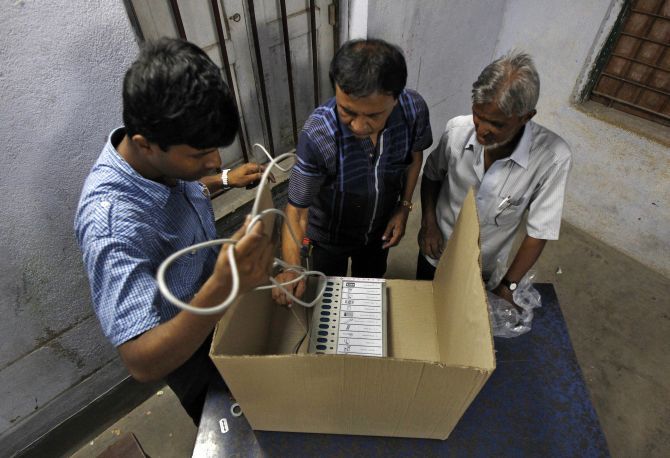The Election Commission on Friday said its much-hyped electronic voting machines challenge is "on" as scheduled on Saturday after the Uttarakhand high court rejected a plea questioning the constitutionality of the move.

"The EVM challenge is on as scheduled. The Nationalist Congress Party and the Communist Party of India-Marxist have nominated three persons each for the challenge," a commission spokesperson said.
He said the two parties will get separate halls to try and tamper with the machines. The challenge will take place between 10 am and 2 pm.
Rejecting a PIL filed by a state Congress leader challenging the constitutional correctness of the EC move, a division bench of Uttarakhand high court, justices Rajeev Sharma and Sharad Sharma gave the green signal to the EVM challenge.
Allowing the Election Commission to go forward with the EVM challenge, the court instructed that as a form of greater good of the public, all national, state and other political parties, NGOs and individuals, electronic media, press, radio, social media, and other platforms have been barred from criticising the use of EVMs in the recent state assembly elections until the decision of election related petitions are pending in the court of law.
The bench said that the Election Commission has been subjected to much negative speculation after successfully organising a free and fair election.
The court pointed out that the work to build EVM machines is done by government agencies and the Election Commission is a constitutional body.
Thus there is no scope to doubt the fair working of the EVMs and hence, the organisation of a demonstration/challenge on Saturday must be left to the discretion of the Election Commission at best.
Petitioner Ramesh Pande had contended that the EC's move was in contravention of Article 324 of the Constitution and was therefore ultra vires.
As per section 80 (a) of the Representation of the People Act, only the high court had the prerogative to organise a hackathon like this, he had said.
The challenge was organised after several major opposition parties had claimed that the faith of people in the machines has eroded.
The Bahujan Samaj Party and the Aam Aadmi Party had alleged that the machines used in the recent assembly elections were tampered with and favoured the Bharatiya Janata Party. Later, several other parties had joined the chorus and wanted the EC to revert to paper ballots.
The commission has pulled out from its strong rooms in Uttar Pradesh, Punjab and Uttarakhand 14 electronic voting machines used in the recent assembly polls there for the challenge.
The NCP and the CPI-M were the only parties which had applied to participate in the challenge. The poll panel had invited the seven national and 49 state parties recognised by it for the challenge. It had left out smaller parties and independents who had contested the recent polls from participating. Even foreign experts are barred.
Since the two parties had not given their preference for the EVMs they would like to tamper with during the challenge, the commission has brought to Delhi 14 machines -- from Ghaziabad and Gautam Buddha Nagar in UP, Patiala and Bhatinda from Punjab and Dehradun from Uttarakhand.
While each participating party can use a maximum of four EVMs for the challenge, sources in the commission said extra machines were also kept as back up keeping in mind any eventuality.
The challengers will get four hours each to tamper with the machines. The challenge will begin at 10 am and end at 2 pm.
Members of a technical committee which helps the EC evaluate the EVMs would judge the proceedings.
Announcing the contours of the 'EVM challenge', the EC had said it has been divided into two parts. First, the parties will have to prove that the EVMs used in the assembly elections in the five states were tampered with to favour a particular candidate or political party by altering the results stored in them.
The claimants will have to alter the results in the control units used during these polls in exactly the same conditions in which EVMs remain under the technical and administrative safeguards of the EC after elections.
They can use a combination of keys on EVMs or over the air communication devices such as cellphone and bluetooth to tamper with the machine to change the results, he said.
Under part two of the challenge, the participants will have to prove that the EVMs used in the assembly polls were manipulated before or on the poll day.
The participant would be considered to have "failed" the challenge if the EVM stops functioning due its inbuilt anti- tampering mechanism.
Also, the challenger would be considered to have failed if it showed the result of the booth where it was used during the assembly polls even after manipulation.
****
AAP all set for its own EVM challenge
Meanwhile, the AAP has announced that it will hold a parallel hackathon of its own on Saturday.
The party will invite wizards and technical experts from political parties, the Election Commission and also the companies which provide the electronic voting machines to the poll panel, for the challenge.
AAP's Delhi unit secretary Saurabh Bharadwaj had said the party would have a "bigger and better" EVM challenge than the one planned by the poll panel.
The machine to be tested in this exercise will be the same used by Bharadwaj in the Delhi Legislative Assembly last month to demonstrate how it can be tampered with.
The EC had called this machine a "look-alike" and not an "ECI-EVM".
The ruling AAP in Delhi, had last week, asked the Election Commission to remove the restrictions placed in the latter's EVM challenge.











 © 2025
© 2025